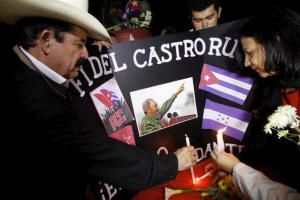|
Cubans fret over life after Castro with
Trump next door
 Send a link to a friend
Send a link to a friend
 [November 28, 2016]
By Simon Gardner and Ana Isabel Martinez [November 28, 2016]
By Simon Gardner and Ana Isabel Martinez
HAVANA (Reuters) - From the Bay of Pigs
invasion to a historic visit by President Barack Obama to Havana, Cubans
have known for generations that whenever the United States turns its
face to Cuba, Fidel Castro would be staring right back.
But the death of "El Comandante" has added to worries among Cubans that
U.S. President-elect Donald Trump will slam the door shut on nascent
trade and travel ties, undoing two years of detente with the United
States under Obama.
Many Cubans believe they could do with their late leader's charisma and
way with words to counter Trump's bombast.
"With 'El Comandante' gone, I am a little fearful of what could happen
because of Trump's way of thinking and acting," said Yaneisi Lara, a
36-year-old Havana street vendor and flower seller.
"He could set back and block everything that's been going on, all the
things Obama has done. And he did a lot, managing to get the U.S. closer
to Cuba," she said, admitting she would consider moving to the United
States herself.
Trump has struck a very different tone from Obama, who reached an
agreement two years ago with Castro's younger brother, President Raul
Castro, to end half a century of hostilities.
Late in his election campaign, Trump sought to reassure Cuban-American
voters in Florida that he was firm in his opposition to the Castros, and
pledged that, if elected, he would close down the newly re-opened U.S.
embassy in Havana.

Earlier on, in the primary contests to pick the Republican presidential
nominee, Trump said he thought restoring diplomatic ties with Cuba was
fine, but that Obama ought to have cut a better deal.
Now that Trump has won the presidency, it is hard to know exactly what
his approach to Cuba will be.
"None of that has been decided," Trump's senior adviser, Kellyanne
Conway, said on NBC's "Meet the Press" on Sunday. "The president-elect
will make those decisions once he takes office."
However, Reince Priebus, who will be Trump's chief of staff when he
takes office on Jan. 20, said Trump would call for more political
freedoms from the Cuban government, and that if he did not get this he
would roll back Obama's opening.
"There isn't going to be a one-way relationship from the United States
to Cuba without some action from the Castro administration," Priebus
said on "Fox News Sunday."
After the death of the 90-year-old Fidel Castro on Friday, Obama called
him a "singular figure," while Trump described him as a "brutal
dictator."
Castro began his career as a revolutionary by toppling a U.S.-backed
government, repelled a CIA-backed counter-revolutionary invasion at the
Bay of Pigs in 1961, and faced off against President John F. Kennedy in
the Cuban missile crisis a year later.
During 49 years in office, he crossed swords with 10 U.S. presidents.
And while he took a lower profile after officially retiring in 2008,
Castro never stopped warning Cubans that the American government was not
to be trusted.
Although moving closer to the United States, Raul Castro has not given
up much ground to the Obama administration in terms of liberalizing
Cuba's one-party political system.

[to top of second column] |

Honduras' former president Manuel Zelaya (2nd L) places candle
beside a picture of Fidel, pay tribute, following the announcement
of the death of Cuban revolutionary leader Fidel Castro, in
Tegucigalpa, Honduras November 26, 2016. REUTERS/Jorge Cabrera

Obama did not succeed in convincing Congress to lift the United
States' tough economic embargo on Cuba, but he personally opposed
the sanctions and used executive actions to allow more contact and
commerce.
The first U.S. commercial flight to Havana in about half a century
is due to arrive on Monday.
'POLAR OPPOSITE'
Trump could easily review such measures. He has included Mauricio
Claver-Carone, a leading advocate for maintaining a tough economic
embargo, in his transition team.
Without giving any specifics, Trump said on Saturday that his
administration would "do all it can" once he takes office to help
increase freedom and prosperity for Cuban people after the death of
Castro.
"Trump is the polar opposite of Obama," said burly Havana taxi
driver Pablo Fernandez Martinez, 39, as he hustled for work.
Life in Cuba remains hard for its educated but underemployed people,
but engagement with the United States has brought in more dollars.
Martinez fears that could dry up in Trump's administration.
"There will probably be less tourist traffic. That will affect
everyone in Cuba, and hit the economy," said Martinez, who earns
$100-$120 a week driving for foreigners.
Pedro Machado, 68, is a retired engineer in marine research who now
rents out rooms in his airy apartment near Havana's "Malecon"
seafront. Watching television with his wife, Machado worried that
Trump's angry rhetoric could spell trouble.

"Trump's policies are very aggressive. We'll have to see what he
actually does. But it certainly looks like bad news for Latin
America and for Cuba in particular," he said.
"My generation benefited from Fidel's revolution, in terms of
education, the poor were helped. Not everything was a bed of roses,
but Fidel helped us," he added "The United States has acted as an
empire, and that's what Trump represents. Given what he has said,
the future is not looking great."
(Additional reporting by Marc Frank; Writing by Frank Jack Daniel;
Editing by Simon Cameron-Moore, Kieran Murray and Frances Kerry)
[© 2016 Thomson Reuters. All rights
reserved.]
Copyright 2016 Reuters. All rights reserved. This material may not be published,
broadcast, rewritten or redistributed. |